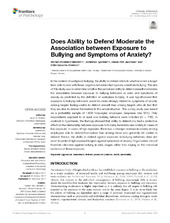| dc.contributor.author | Nielsen, Morten Birkeland | |
| dc.contributor.author | Gjerstad, Johannes | |
| dc.contributor.author | Jacobsen, Daniel Pitz | |
| dc.contributor.author | Einarsen, Ståle Valvatne | |
| dc.date.accessioned | 2018-08-23T06:40:17Z | |
| dc.date.available | 2018-08-23T06:40:17Z | |
| dc.date.issued | 2017-11-07 | |
| dc.Published | Nielsen MB, Gjerstad J, Jacobsen DP, Einarsen S. Does ability to defend moderate the association between exposure to bullying and symptoms of anxiety?. Frontiers in Psychology. 2017;8:1953 | eng |
| dc.identifier.issn | 1664-1078 | |
| dc.identifier.uri | https://hdl.handle.net/1956/18201 | |
| dc.description.abstract | In the context of workplace bullying, the ability to defend refers to whether or not a target feels able to deal with those negative behaviors that typically constitute bullying. The aim of this study was to determine whether the perceived ability to defend oneself moderates the association between exposure to bullying behaviors at work and symptoms of anxiety as predicted by the definition of workplace bullying. It was hypothesized that exposure to bullying behaviors would be more strongly related to symptoms of anxiety among targets feeling unable to defend oneself than among targets who do feel that they are able to defend themselves in the actual situation. This survey study was based on a probability sample of 1,608 Norwegian employees (response rate 32%). Only respondents exposed to at least one bullying behavior were included (N = 739). In contrast to hypothesis, the findings showed that ability to defend only had a protective effect on the relationship between exposure to bullying behaviors and anxiety in cases of low exposure. In cases of high exposure, there was a stronger increase in anxiety among employees able to defend themselves than among those who generally felt unable to defend. Hence, the ability to defend against exposure to bullying behaviors does not seem to protect high-exposed targets against symptoms of anxiety. Organization should therefore intervene against bullying in early stages rather than relying on the individual resilience of those exposed. | en_US |
| dc.language.iso | eng | eng |
| dc.publisher | Frontiers | eng |
| dc.rights | Attribution CC BY | eng |
| dc.rights.uri | http://creativecommons.org/licenses/by/4.0/ | eng |
| dc.subject | aggression | eng |
| dc.subject | harassment | eng |
| dc.subject | distress | eng |
| dc.subject | power (im-)balance | eng |
| dc.subject | health | eng |
| dc.subject | personality | eng |
| dc.title | Does ability to defend moderate the association between exposure to bullying and symptoms of anxiety? | eng |
| dc.type | Peer reviewed | |
| dc.type | Journal article | |
| dc.date.updated | 2018-04-04T08:36:35Z | |
| dc.description.version | publishedVersion | |
| dc.rights.holder | Copyright 2017 Nielsen, Gjerstad, Jacobsen and Einarsen | eng |
| dc.identifier.doi | https://doi.org/10.3389/fpsyg.2017.01953 | |
| dc.identifier.cristin | 1512036 | |
| dc.source.journal | Frontiers in Psychology | |

